
|
September 29, 2011 - No. 4 40th Ontario General Election The Demise of Good Faith Collective Bargaining in the Ontario Public Sector -- An Election Issue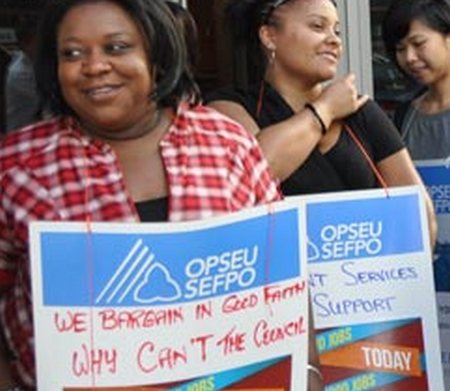 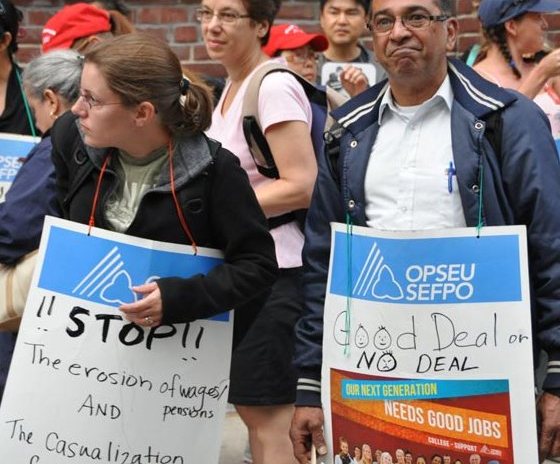 Support staff from colleges in Toronto on strike in mid-September. • The Demise
of Good Faith Collective
Bargaining in the Ontario Public Sector -- An Election Issue -
Dave Starbuck Health Care Is a Right 40th Ontario General Election The Demise of Good Faith Collective Bargaining in the Ontario Public Sector -- An Election Issue
Days before the beginning of the 2007 Ontario provincial election, the Ontario Liberals promised to recognize the right to collective bargaining of part-time college workers as part of a review of the Colleges Collective Bargaining Act (CCBA). With this sleight-of-hand, they wiped the issue of the rights of part-time college workers off the election agenda. This was one issue that had the potential to explode in the face of the McGuinty Liberals as OPSECAAT was prepared to challenge leading ministers at campaign stops across the province. College workers have paid dearly for their trust in the Liberal Party. The Liberals reneged on their 2007 deal. The part-time issue has not been resolved. In the fall of 2007, the Liberal government created the Whittaker Commission to revise the old CCBA under the hoax of "recognizing" the right of part-time and sessional college workers to unionize. After part-time college teachers completed their certification vote on February 5, 2009, the ballots were seized by the Ontario Labour Relations Board (OLRB). College lawyers have succeeded in stalling the counting of the representation vote ballots at the OLRB in a process that is expected to take ten years to complete. The Whittaker Commission provided a justification for a long list of anti-worker, anti-union revisions to the CCBA which were passed in 2008. The new terms of the CCBA were used to allow shock-and-awe tactics during the faculty negotiations of 2008-09, with the Council imposing a new contract, claiming a right they did not have in the Act and manipulating the voters' list in order to obtain a razor thin acceptance of the imposed contract. Now, this year, we have the first round of support staff contract negotiations under the new CCBA. Right from the beginning the College Employer Council showed a refusal to bargain in good faith. While the union held demand-setting meetings across the province and came to the bargaining table with these demands concretized as proposed contract language, the Council only offered to discuss housekeeping items (such as changing the reference to the CCBA from 1990 to 2008) and a wish-list of potential concessions. After dragging their feet all summer, the Council made their monetary offer in the media on August 26, the last Friday afternoon preceding the strike deadline. Clearly the tone was set and the Council was saying that only capitulation by the workers could avert the necessity of strike action, a message that was made crystal clear by the September 9 refusal of the College Employer Council to accept the union's offer to return to negotiations. After the Second World War, a social contract was established in Canadian society in which workers and their families were provided with a modern level of wages, benefits, working conditions, education, health care and pensions, etc., in exchange for the workers accepting limitations to their political demands. In general, although there were occasional sharp conflicts, both sides worked within a set of parameters that recognized the validity of the claims of each side. This social contract reached its most profound level during the Just Society of Trudeau and the reign of Bill Davis in Ontario. This was the time when a regime of labour relations was established in the Ontario community college system and that regime reflected the prevailing mores of the times. The greatest advance was in the establishment of the faculty workload formula in the late eighties as a result of the 1984 strike. However, beginning with Mulroney, the anti-social offensive of the monopolies has slowly intensified. The colleges were increasingly starved of funds during the Rae Days and the Common Sense Revolution of Mike Harris. While the relative economic recovery of the first decade of the twenty-first century allowed the McGuinty Liberals to ease the burden on the colleges slightly, the economic crisis of 2007-08 has been used to impose new arrangements in labour relations in Ontario, notably the repudiation of the 2007 election political bargain to recognize the rights of part-time college workers as part of a review of the whole CCBA. This is justified by repeating that the world has changed, the world has changed!
New arrangements in public sector labour relations will come into being. The question is whose interest will these new arrangements serve: the public and human-centred college education or the monopolies and capital-centred college education. This is a political question and we are in the midst of a provincial election. College workers will make significant progress in advancing their interests if they firmly put the issue of Ontario's community colleges on the agenda of this election, hold the Liberal Party to account for its abrogation of the 2007 political bargain to recognize part-time rights, and elect candidates who will find a just solution to the problems facing the Ontario community college system by recognizing the rights of all. Fight for the Rights of All! College Support Staff Fight for Their Rights College Employer Council Forced to Negotiate Acceptable Contract
Taking political action and making Ontario's community colleges an election issue by picketing Ontario premier Dalton McGuinty's campaign stops in northern Ontario forced the College Employer Council to return to the bargaining table, give up its obstructionism and hammer out an agreement which the bargaining committee can recommend. The agreement was reached after a nineteen day strike by more than 8,000 community college support staff. The agreement must be ratified by college support staff workers. Rod Bemister, chair of the OPSEU bargaining team, said in a press release that the union managed to secure key contract proposals it had brought forward. "Our position from the start of contract talks was that this round of negotiations would be about preserving good jobs our members currently enjoy, while at the same time ensuring that good jobs will be in place for future college support staff," Bemister said. "We believe we met those objectives." The support staff and their bargaining committee were able to rebuff the attempt of the College Employer Council to erode the contract language, wages and working conditions of existing workers and to impose a two tier system for new hires. The attempt by the Council to introduce changes to working conditions in their proposals for flexible hours of work, a compressed work week, and to allow students to be hired to work full days all year round, was restricted as was the Council's proposal for a lengthened probationary period. The bargaining committee was able to have the letter of understanding on contracting out placed in the collective agreement as an appendix, thereby strengthening its standing. Changes to the grievance process and to the provisions for union time off were agreed to. The wage offer was raised to 1.5%, 1.75% and 2.0%, a significant improvement over the original Council offer. The union bargaining committee put off the issues of part-time rights and retiree benefits to a future date. Dalton McGuinty and the Ontario Liberal Party dread the thought of the situation facing Ontario's community colleges being placed on the election agenda and becoming a major issue, as they know this will blow up in their face. In 2007, they promised to recognize part-time rights as part of a review of the Colleges Collective Bargaining Act (CCBA). This succeeded in keeping colleges off the election agenda that year. However, the Liberals reneged on that deal, imposing anti-worker revisions on the CCBA in 2008, while delaying the counting of the part-time union recognition votes at the Ontario Labour Relations Board (OLRB). Now, as soon as the Liberals are confronted in the election, McGuinty waves his magic wand and the College Employer Council reverses face, stops acting like it can dictate the terms of the contract with impunity, and in 36 hours bargains a contract that the union bargaining committee can recommend to its members. What is the significance of this? At a time when the
post-war social contract in labour relations has been declared null and
void, the workers find themselves increasingly restricted in waging
their economic struggles. Legislation is amended in favour of the
employer, the OLRB rules in favour of the employer
and then legislatures threaten back-to-work legislation or put severe
restrictions on workers' rights to bargain and strike in defence of
their interests. In
these
circumstances,
college
workers cannot afford to wage their
struggle in ways which were sufficient in the past but are no longer
effective today. It is necessary to find the ways which in the present
will give voice to the valid claims of college workers and college
students for a principled solution to the negation of the rights of
part-time college employees to freedom of association and of collective
bargaining, for an increase in provincial funding for Ontario's
community colleges to at least the national average and for a
human-centred college education system.
There still remains time for college
workers to work to keep the colleges on the election agenda. The more
this is done now; the more the new government will need to find an
acceptable solution to the crisis in Ontario's community colleges. Community College Support Staff Strike Striking college support staff at Northern College in Timmins. On September 18, Ontario community college support staff reached a tentative deal with the College Employers Council (CEC) and returned to work on September 20. Eight thousand Ontario community college support staff, members of the Ontario Public Service Employees Union (OPSEU), launched strike actions on September 1 at more than 100 campuses of Ontario's 24 community colleges. This was the first strike by support staff workers since 1979. The college workers were forced to take this action due to the intractable stand of the CEC, which refused to bargain in good faith, using delaying tactics, bargaining in the press and disinformation in an attempt to impose new arrangements in labour relations in Ontario's colleges. The community college support staff workers accepted social responsibility and took a courageous stand in defence of the rights of all. At the centre of their struggle was the demand that
wages, benefits and working conditions be maintained at a Canadian
standard, expressed in their call for good jobs, both today and
tomorrow. Their number one demand was for a resolution to the
long-existing part-time workers crisis. They demanded that the
colleges voluntarily recognize the collective bargaining rights of
part-time college support staff workers and provide job security by
agreeing that a minimum of 80 per cent of support staff work be
performed by full-time workers. The workers also sought a wage increase
in pace with inflation, asking for a three per
cent increase in each of three years, a modest demand given inflation
was running at 3.7 per cent in May. The CEC used the media to make
their wage offer of 3.25 per cent in the second and third year of the
contract, preceded by a lump-sum payment of 1.5 per cent in the first
year, which they agreed to roll into
the wage scale only in the waning hours of negotiations. Support staff work in the registrar's, financial aid, payroll and accounting offices; they are departmental secretaries and receptionists; lab technicians and technologists; janitorial, maintenance, groundskeeping, receiving and moving personnel; information technology staff and library technicians; special needs support and daycare workers. More than 10,000 part-time support staff and nearly 20,000 full-and part-time faculty were forced to cross the support staff picket lines and perform their duties under threat of dismissal. A support staff worker on one picket line pointed out the cynicism of the colleges' decision to maximize the use of part-timers when they are otherwise used as casual labour. "It shows that part-timers can do the same job as us but don't get the same recognition or representation," said the picketer. Faculty, students and others at the colleges showed their support by joining the picket lines, distributing food and drinks and discussing the issues with everyone. 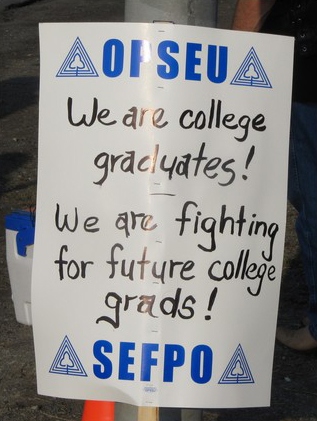 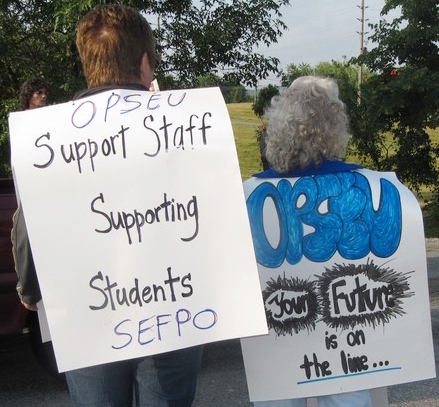   Boreal College and Cambrian College, Sudbury
McGuinty Liberals Held Accountable for College CrisisDuring their strike, Ontario community college support staff workers made their struggle for the rights of all and for a collective agreement they can accept an election issue by confronting Ontario Premier Dalton McGuinty at his campaign stops in Northern Ontario. As a result, the College Employer Council, which had been refusing to negotiate, was forced back to the bargaining table. On September 15, after being unable to evade three OPSEU members at a campaign stop at the Thunder Bay Bombardier plant, the premier "indicated that he would attempt to get a mediator to the table and make them sit in the room together until there was an agreement," said Elaine Kerr, a support mobilizer for OPSEU Local 612 at Sault College.
The same evening, forty striking support staff workers from Cambrian College and their supporters held a spirited rally outside a Liberal election event attended by McGuinty at the Caruso Club in Sudbury. For more than two hours, the group marched in front of the hall demanding a return to negotiations and a contract they can accept. McGuinty snuck into the hall with his security detail. Until cornered by the college support workers, the premier had been silent on the college support strike. Resolving the crisis in Ontario's community colleges in favour of the students and college workers is a political question that the Ontario Liberal Party is desperate to keep off the election agenda because its preoccupation is quite the opposite. The Liberal Party reneged on its 2007 election promise to recognize the right to collective bargaining of part-time college workers and passed several anti-worker, anti-union revisions to the Colleges Collective Bargaining Act that were used to impose the College Employer Council contract during the faculty negotiations of 2008-09. It pretends to sit by as neutral party while college lawyers stall the counting of the part-time union recognition votes at the Ontario Labour Relations Board. On top of all this is the chronic underfunding of the post-secondary education system. Dalton McGuinty and the Ontario Liberal Party must be held accountable for the crisis in Ontario's colleges. Break the Silence! October 4 Ratification Vote on Tentative Agreement
|
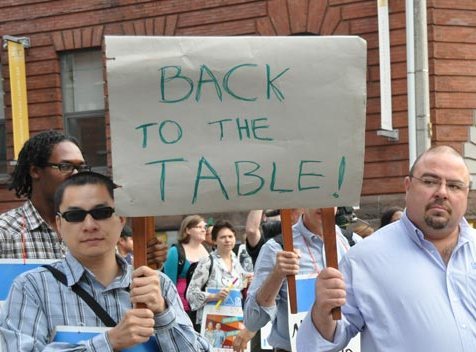 The latest round of
contract negotiations between
Ontario community college support staff and the College Employer
Council has confirmed what the set of academic negotiations in 2008-09
revealed: there is no longer any such thing as good faith collective
bargaining in labour relations in the Ontario public
sector.
The latest round of
contract negotiations between
Ontario community college support staff and the College Employer
Council has confirmed what the set of academic negotiations in 2008-09
revealed: there is no longer any such thing as good faith collective
bargaining in labour relations in the Ontario public
sector. What are college workers to
do faced with this situation
where the old post-war social contract which provided for good-faith
collective bargaining between the employer and labour is no more? Now
the employer is seeking to be the sole decision-maker when it comes to
wages, benefits and working conditions
in the colleges. Workers are to fend for themselves and any rights
which workers have gained through collective bargaining are to be
negated. Provisions of law that assist the employer to exert their will
such as those that enable employers to dismiss workers from a different
bargaining unit that engage in sympathy
actions are strengthened while those that are of assistance to the
workers such as the former prohibition on the colleges employing
replacement workers are eliminated. In short, the employer is allowed
to act with impunity and the workers are increasingly restricted in the
actions that they can take in defence of their
interests.
What are college workers to
do faced with this situation
where the old post-war social contract which provided for good-faith
collective bargaining between the employer and labour is no more? Now
the employer is seeking to be the sole decision-maker when it comes to
wages, benefits and working conditions
in the colleges. Workers are to fend for themselves and any rights
which workers have gained through collective bargaining are to be
negated. Provisions of law that assist the employer to exert their will
such as those that enable employers to dismiss workers from a different
bargaining unit that engage in sympathy
actions are strengthened while those that are of assistance to the
workers such as the former prohibition on the colleges employing
replacement workers are eliminated. In short, the employer is allowed
to act with impunity and the workers are increasingly restricted in the
actions that they can take in defence of their
interests.
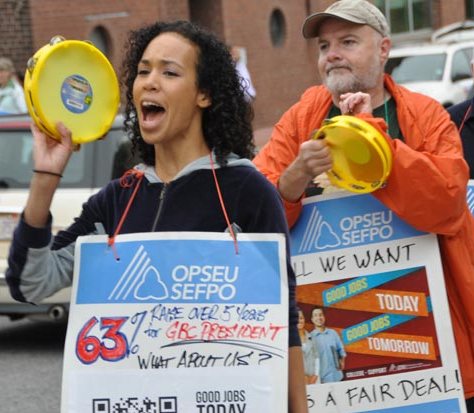
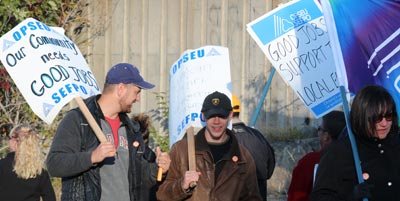
 One of Ontarians' biggest
concerns is their access to
health care as
a basic right. This right has been under sustained attack from the
anti-social offensive implemented by successive governments at the
provincial and federal level which view public services and social
programs as a burdensome cost that must be
cut in the name of "restraint" or "austerity." The attacks on the
health care system are directed in no small part at those workers who
provide these vital services. Just one example are the more than
3,000 registered nurses and allied health professionals of the Ontario
Nurses' Association (ONA) who work as Case
Managers, Placement Coordinators, Nurse Practitioners and as other
health professionals at 10 of Ontario's 14 Community Care Access
Centres (CCACs). The ONA reported on September 27 that their members
have now entered the critical final days of bargaining, including
mediation which began on September
28. They have given their negotiating team an overwhelming 95-per-cent
strike mandate and if an agreement is not reached, these health
professionals will be on strike on October 3.
One of Ontarians' biggest
concerns is their access to
health care as
a basic right. This right has been under sustained attack from the
anti-social offensive implemented by successive governments at the
provincial and federal level which view public services and social
programs as a burdensome cost that must be
cut in the name of "restraint" or "austerity." The attacks on the
health care system are directed in no small part at those workers who
provide these vital services. Just one example are the more than
3,000 registered nurses and allied health professionals of the Ontario
Nurses' Association (ONA) who work as Case
Managers, Placement Coordinators, Nurse Practitioners and as other
health professionals at 10 of Ontario's 14 Community Care Access
Centres (CCACs). The ONA reported on September 27 that their members
have now entered the critical final days of bargaining, including
mediation which began on September
28. They have given their negotiating team an overwhelming 95-per-cent
strike mandate and if an agreement is not reached, these health
professionals will be on strike on October 3.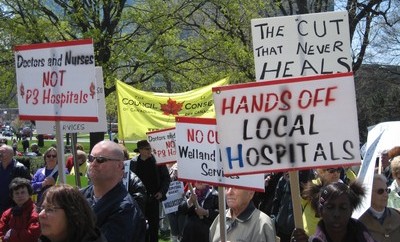 "Wait lists for long-term
care beds, now numbering more
than 23,000,
have never been higher, while home care wait lists have numbered over
10,000 for more than a decade. [...]"
"Wait lists for long-term
care beds, now numbering more
than 23,000,
have never been higher, while home care wait lists have numbered over
10,000 for more than a decade. [...]"